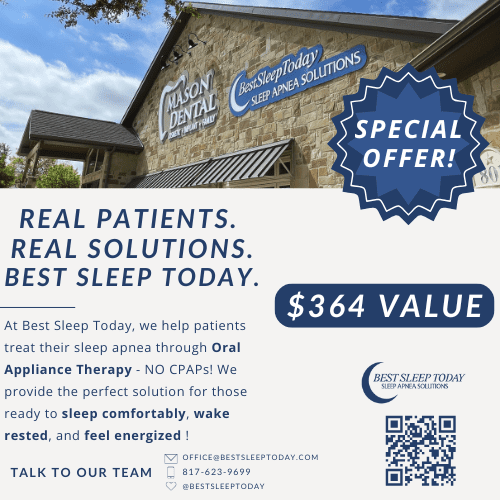
Sleep Apnea
Sleep apnea is a sleep-related breathing disorder, which is defined by irregular breathing patterns during sleep.
People who have sleep apnea frequently have slow breathing or stops (cessations) while they are asleep. Sleepers might not fully awaken and continue to be unaware that their nocturnal breathing is abnormal, even though these gaps lead a person to wake up regularly and lower the quality of their sleep.
Sleep Apnea Symptoms
The symptoms of sleep apnea include abnormal breathing during sleep and poor sleep quality that affects daytime functioning.
- Excessive sleepiness during the day
- Loud snoring that’s frequently interspersed with choking or gasping noises
- Morning headaches that could last for several hours after waking up
- Dry tongue when you wake up
- Periods of intermittent alertness and restless sleep during the night
- Increased urge to get out of bed to use the bathroom
- Intolerance or frustration
- Focus decreased
- Brain fog
Sleep apnea is classified into many categories based on the source of breathing interruptions.
Obstructive Sleep Apnea
During sleep, the airway at the back of the throat narrows or gets obstructed, causing Obstructive Sleep Apnea (OSA), a medical condition.
This can cause irregular breathing and snoring, leading to waking up from airway blockage.
In some situations, people may make snorting or coughing sounds while exhaling deeply due to the contraction of their throat muscles.
The most common type of sleep apnea is known as obstructive sleep apnea. It’s estimated that anywhere from 10% to 30% of adults may be affected by this condition.
Central Sleep Apnea
The communication between the brain and the muscles that govern breathing is disrupted in central sleep apnea (CSA). Breathing may thus become shallower and have brief pauses.
Compared to obstructive sleep apnea, central sleep apnea is less common. Less than 1% of the population is thought to have CSA.
How Can You Tell If I Have Sleep Apnea?
Partial Blockage vs. Full Blockage
Obstructive sleep apnea is a medical condition where your tongue and soft tissues actually close off your airway and stop air from entering your lungs. When this happens during sleep, the oxygen in your blood decreases, your heart races, and your brain panics – causing your body to startle awake. This cycle repeats itself all night long.
Oral appliances gently hold your lower jaw forward while you are sleeping. This forward position advances your tongue and helps open your airway to reduce snoring and alleviate OSA symptoms.
See Your Airway Flow and Constriction in 3D
Best Sleep Today uses some of the most advanced technology on the market, including a brand new CT machine that will help you understand exactly how your airway constricts. A precise 3D model of your throat and airway can be analyzed to perfectly customize your Oral Appliance and more. After all, seeing is believing!
So What’s My Next Step?
Ready to learn about your options to treat sleep apnea? What if we told you those options don’t have to include bulky CPAP machines and hoses or expensive surgeries? It’s true! Let’s take a look at your options here, or by calling our staff to schedule your consultation today.














